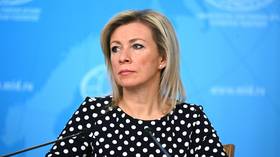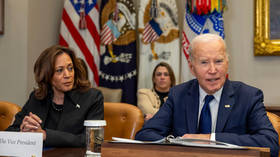'Test of democracy': Catalan leaders on trial amid political turmoil for Spanish government
The divisive issue of Catalan independence strikes again in Spain, where a trial of jailed provincial leaders started this week. The government is on the brink of collapse without the support of Catalan lawmakers in parliament.
Catalonia, Spain's autonomous northern region with a long history of pro-independence sentiment, attempted to secede in October 2017. Over 40 percent of Catalans turned out for the referendum and voted in a landslide in favour of independence, which Madrid refused to recognize and attempted to stop through police action. The provincial government then declared Catalonia an independent state. The Spanish government moved to quash the bid with force, arresting 12 officials and sending others fleeing.
Trial of separatists and test of democracy
The failed attempt is back in the public focus in Spain this month for two reasons. One is that the long-expected trial of the 12 arrested separatist leaders which began on Tuesday. The charges against them vary from misappropriation of public funds (for printing ballots and holding the poll) to sedition and rebellion, and may result in up to 25 months in jail.
Catalan political prisoners and leaders. #Cataloniapic.twitter.com/tI131WGXEn
— Josep Goded (@josepgoded) February 12, 2019
The accusations against the Catalan leaders are based on the fact that the Spanish constitution, which was adopted following the death of dictator Francisco Franco in 1975, forbids any part of the country from seceding.
The defense is expected to argue that the referendum was a peaceful exercise of Catalonia's right to self-determination and that the Spanish constitution is contrary to European values and laws in this regard. Rebellion however implies the use of violence, which was done by the Madrid-dispatch police against Catalans, not by them.
🎥 Tonight projections of the police violence from the 1st October referendum on the Spanish Supreme Court. #Catalonia#ThisIsTheRealSpainpic.twitter.com/fFozuXA6B4
— Catalan Republic🎗 (@CatalanNation) February 11, 2019
Ex-Catalonia chief Carles Puigdemont, who fled to Spain, calls the trial a test of Spanish democracy and independence of its judiciary. Carlos Lesmes, the president of the nation's Supreme Court, agrees the proceedings are "the most important trial that we've held since democracy [returned]".
The trial begins after a long wait for the defendants, who even went on a hunger strike last December, accusing the Spanish government of stalling their prosecution and obstructing their attempts to secure scrutiny over the process from the European Union. The trial is expected to last for several months at least.
Also on rt.com Jailed Catalan official brought to hospital after 2 weeks of hunger strikeShaky ground for government
Days before the trial started thousands of opponents of Catalan independence staged a rally in Madrid demanding that the government stand up to the separatists. Organized by Spain's right-wing parties, they demanded that Prime Minister Pedro Sanchez rejected the demands for a new referendum from Catalan lawmakers, whose support is necessary to keep his minority government afloat.
#Breaking: Huge protest going on in #Madrid in #Spain against the socialist government of "Pedro Sanchez", and his partners against the coup separatists #Catalan and in favour of electoral advancement. pic.twitter.com/nbdFAGLtqp
— Sotiri Dimpinoudis (@sotiridi) February 11, 2019
The socialist-led cabinet of Sanchez took power last April, replacing, through a confidence vote, the conservatives of Mariano Rajoy, under whose watch the Catalan referendum happened. While Sanchez supported the way his predecessor handled the crisis, he also advocated dialogue with Catalan nationalists.
His government also relies on Catalan support to pass laws and made several concessions to them lately – which prompted the right-wing opposition to call their supporters onto the streets at the weekend. But what some opposition politicians branded as treason by Sanchez, was apparently considered not enough by the Catalans themselves.
The tacit alliance is set to fail on Wednesday, when the government's 2019 budget proposal is to be voted on in the parliament. Minority regional parties, including the Catalans, refused to support the crucial piece of legislation.
Sanchez earlier put his political survival at the stake, stating that if the proposal is not adopted, he would call a snap election in mid-April. Neither side seems to be willing to yield, with means Spain's political turmoil is only likely to escalate.
If you like this story, share it with a friend!















